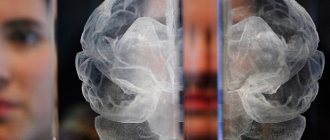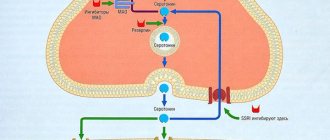A neurotic disorder in which a person is always in a sad mood, generally inhibited and inactive, is usually called depressive neurosis. It is often accompanied by autonomic and somatic disorders, and the patient’s sleep is disturbed. With all this, the patient does not cease to be optimistic about the future, he also maintains his ability to work in order to carry out his professional activities, in addition, his personality also does not change deeply. To diagnose depressive neurosis, you need to consult a neuropsychiatrist.
For its treatment, psychotherapeutic techniques are used in conjunction with medications such as antidepressants, sedatives, psychostimulants, antipsychotics, and also in conjunction with physiotherapy.
The concept of depressive neurosis is often replaced by “neurotic depression.” By the way, not all experts consider it an independent disease.
Depressive neurosis, as a rule, develops in straightforward and purposeful people who are accustomed to hiding their inner experiences and not showing them to others. In addition, it affects those who have low self-esteem, who experience certain difficulties in making any decision, or who have difficulty adapting to any change.
Call us now:
+7 (812) 454-00-50
Prices for Ultramed clinic services
Why does depressive neurosis occur?
This condition occurs due to external circumstances that traumatize the psyche. The reasons that lead to the occurrence of this condition are very significant for the patient and last for quite a long time. Psychotraumatic situations that lead to depressive neurosis are of two types.
- Neurosis can arise after numerous failures that affect several areas in the patient’s life, and because of which he begins to consider his life “unsuccessful.”
- It can also occur with “emotional deprivation,” that is, if the patient hides his relationship with someone, he is unable to communicate with family, and so on.
As a rule, the cause of depressive neurosis is traumatic circumstances that have existed for a long time. The patient begins to consider the current circumstances insoluble, and strives not only to find a solution to the problems, but rather to hide the negative emotions associated with it. As a result, he may develop functional disorders of the central nervous system, primarily autonomic and somatic disorders, from which depressive neurosis begins.
What treatment is used?
Psychotherapy is offered to people suffering from neurosis.
The symptoms of neurosis affect daily life, which is greatly impaired. And as soon as the quality of life decreases, it is worth seeking the help of a psychotherapist. In a safe therapeutic space, the patient has the opportunity to express his feelings, dominant obsessive thoughts, which creates the opportunity to distance himself from internal conflict, become aware of its origins, and also to change beliefs, thinking and, therefore, also feelings.
Drug treatment also brings results, the inclusion of which is decided by a psychiatrist. According to doctors, patients often say after treatment: “I’m breathing again!” You should not ignore the symptoms of neurosis, because it worsens the quality of life.
How does depressive neurosis manifest?
As a rule, it is accompanied by the following symptoms:
- The patient's vital activity decreases and he becomes more lethargic
- He's in a depressed mood
- His thinking also slows down and he begins to speak slowly.
If the patient just begins to fall into such a state, then he experiences a depressed mood along with various vegetative and somatic disorders, that is, he may experience:
- Dizziness,
- Cardiopalmus,
- Changes in blood pressure,
- Stomach and intestinal dysfunctions.
In addition, the patient loses his appetite. All this leads to the patient being sent for a medical examination, as a result of which symptomatic therapy is prescribed.
Sometimes, even if the necessary therapy is carried out, the patient feels increasingly weak, his blood pressure constantly drops, and his mood worsens. The patient is always sad, lacks positive emotions, and stops enjoying life. His motor activity also decreases, he begins to think slowly, speak quietly and slowly. The patient stops looking for entertainment, it is difficult for him to contact someone, although he may begin to succeed at work, since depressive neurosis does not affect his professional activities, and even on the contrary, many patients become completely absorbed in their activities in order, for example, to escape from their unsuccessful family relationships.
As a rule, depressive neurosis is accompanied by insomnia, night awakenings, the patient cannot fall asleep for a long time, he often wakes up at night, and at this time his heartbeat may increase, and he may feel anxiety, although the patient is not fixed on the pain in the heart. In the morning, the patient usually feels weak and overwhelmed.
Depressive neurosis differs from the usual depressive state in mildly expressed clinical symptoms that do not develop into psychosis. People suffering from depressive neurosis maintain a sense of self-control, respond adequately to everything that happens around them and do not stop contacting other people. They do not have thoughts of suicide, and they do not lose their optimism about their future. For example, patients diagnosed with psychotic depression see no prospects for their future. In this case, on the contrary, when thinking about his plans, the patient may not even take into account the current unfavorable circumstances.
Where to treat neurotic depression
Rehab Family, a family addiction treatment clinic, specializes in the treatment of mental disorders, including neurotic depression. Experienced specialists working in the clinic understand: in order to defeat the disease, one should fight not the symptoms, but the causes that led to their appearance. Only psychotherapy can cope with this task. This could be cognitive or gestalt therapy, psychoanalysis and art therapy, breathing exercises and neurolinguistic programming.
Patients of the clinic, with the help of psychologists, psychotherapists, and psychiatrists, will be able to find the often hidden causes of suffering and learn to cope with them. Unlike other institutions, Rehab Family treats each person not as an individual, but as part of a family and community.
An important nuance in the treatment of depressive disorders in our clinic is treatment without the use of harmful drugs. This approach allows achieving high results in treatment.
How to diagnose depressive neurosis
Diagnosing depressive neurosis is quite difficult, since the patient does not think that his well-being is connected with the psychological situation, and when consulting with a specialist, he may not even mention that any traumatic circumstance is pressing on him. That is why very often signs of depressive neurosis are attributed to some kind of somatic disease, for example, chronic gastritis, colitis, and so on. It is very important that such a patient consult a neuropsychiatrist. He will carefully question the patient in order to determine the cause of the disease and identify the patient’s tormenting experiences. To exclude somatic pathology, the patient is prescribed a series of examinations (for example, electrocardiogram, ultrasound) and medical examinations by specialists such as a cardiologist, gastroenterologist, and so on.
It is very important to distinguish the symptoms of depressive neurosis from other neuropsychiatric disorders. When diagnosing depressive neurosis, it is necessary to take into account the fact that it is often combined with depressive symptoms and other neurotic manifestations. It is necessary to carefully examine the history and mental status of the patient in order to distinguish the state of depressive neurosis from other types of depression or the depressive stage of manic-depressive psychosis, which is characterized by a recurrent sudden nature and significant mental disorganization of the person.
Identifying symptoms
The nature of neurotic depression is psychogenic. Features such as loss of strength and bad mood come to the fore.
Experts identify other symptoms of neurotic depression:
- increased irritability,
- feeling of anxiety,
- insomnia,
- headache.
The patient is haunted by phobias and obsessive, and sometimes suicidal, thoughts. There are also physical signs: joint pain, disturbances in the gastrointestinal tract, problems in the intimate area.
Depressive neurosis and its treatment
Depressive neurosis can be effectively cured only if, in parallel with psychotherapeutic treatment, therapy is carried out using medications, as well as physiotherapeutic methods. If a patient is diagnosed with depressive neurosis, then his treatment is carried out as follows. The psychotherapist convinces the patient to logically work through the entire traumatic situation so that the patient can change his attitude towards such circumstances. In addition, they often resort to the method of self-hypnosis as an additional method. At the same time, the patient pronounces certain phrases and expressions that are aimed at giving him a new perspective on a specific problem.
As a rule, psychotropic drugs, and more specifically antidepressants, are used for drug therapy for depressive neurosis. In addition, taking into account the peculiarities with which this disease occurs, doctors can often use tranquilizers, antipsychotics, sedatives and nootropic psychostimulants during treatment. It must be borne in mind that by carrying out professionally selected drug therapy, without resorting to psychotherapeutic courses, it is impossible to obtain a complete recovery. In this way, the patient’s condition can only be temporarily or partially improved.
In addition, various physiotherapeutic methods, such as various types of massage, darsonvalization, electrosonotherapy, acupuncture, and other methods, can help improve well-being. The necessary physiotherapeutic procedures that will be optimally combined will be selected by the physiotherapist, and he must take into account all the individual characteristics of the patient.
How to treat neurotic depression
The diagnosis of “neurotic depression” is made by a psychiatrist based on tests and the presence of symptoms corresponding to the disease. The modern approach involves the use of several techniques - pharmacological, psycho- and social therapy. With the help of antidepressants and tranquilizers, acute manifestations of the disease are relieved, after which the stage of communication between the patient and the doctor follows. Psychotherapy sessions end only after the patient has fully recovered. Along with this, family and friends should take care of creating the most comfortable living conditions for the person suffering from this form of depression.
Other effective techniques include:
- hypnosis treatment,
- homeopathy,
- dolphin therapy,
- physical exercise.
Treatment for neurotic depression should be comprehensive.
Depressive neurosis and its outcome
If the treatment of this disease was carried out correctly, in the right direction, using all the above methods, then the patient after such therapy completely recovers and begins to live his previous life. If its treatment is delayed, then over a long period of time it can transform into various neurotic disorders, thereby complicating the patient’s mental state. That is why it is very important to diagnose depressive neurosis in time and begin to treat it in order to avoid further complications, so that the world around us will shine with bright colors.
Neurotic depression and its types
Experts identify several forms of the disease: bipolar, unipolar, reactive, endogenous, situational.
The endogenous form is characterized by a long course; the monopolar form is characterized by a single emotional tone, without ups and downs of mood; the bipolar form is characterized by mood swings and a manic state.
Whatever diagnosis the doctor makes, the prognosis for complete healing is positive, and recovery can occur in a short time. Of course, provided that the patient adheres to all the doctor’s recommendations.
Diagnosis of neuroses
It is very important to detect neurosis in time. Over time, neurotic disorders, if left untreated, can lead to the development of more serious mental illnesses: psychosis, depression, etc.
In neurotic disorders, differential diagnosis is also important, since some symptoms of neurosis are also observed in other disorders.
The main diagnostic criterion that distinguishes neuroses from psychoses or schizophrenia is that with neuroses the patient retains a sense of reality. A patient with neurosis distinguishes psychopathological symptoms from real phenomena. In addition, a person usually understands that he is sick and wants to get rid of a neurotic disorder. Patients with psychosis, schizophrenia and other serious mental illnesses usually do not realize that they are sick and do not perceive obsessive thoughts, phobias, agitation attacks and other symptoms as something unnatural.
Diagnosis of neuroses can be carried out by collecting anamnestic information : patient complaints, information about other diseases, diseases in the family, etc.
It is also possible to use laboratory and electrophysical studies : EEG, CT, MRI, etc. These methods will help determine how well the internal organs are working, as well as exclude the presence of other mental and even somatic diseases.
Types of neuroses
There are three main types of neurotic conditions:
- Neurasthenia . This type of neurosis is characterized by excessive fatigue and nervous exhaustion. A person reacts painfully to stimuli: it seems to him that the light is too bright, the sounds around are too loud, the temperature is either too high or too low. A person may be bothered by pain, noise and pulsations in the head, and rapid heartbeat.
- Anxiety-phobic disorder (obsessive-compulsive disorder) . A person constantly feels causeless anxiety, he is haunted by obsessions, fears, phobias begin to develop, and sometimes panic attacks occur.
- Hysterical neurosis. The person becomes nervous and overly emotional. Hysterical neurosis is characterized by the appearance of convulsive syndromes, hysterics, attacks of suffocation and hypertensive crises. A person always strives to be in public; he always needs spectators to display hysterics or seizures.
The previously mentioned signs of neurosis represent a kind of generalized list of manifestations of neurotic disorders. The manifestation of certain symptoms is determined directly by the type of neurotic disorder.
Neurasthenia, for example, is characterized by disturbances in general well-being, as well as increased sensitivity to irritants and some somatic manifestations. Anxiety-phobic disorders are mainly accompanied by disturbances in the emotional sphere. Hysterical neurosis is characterized by disturbances in the emotional sphere and the sphere of drives.
| |
Diagnosis of the disease
Psychiatrists are involved in the diagnosis and treatment of neuroses. The problem can be diagnosed through a psychiatric examination, but it is always important to take a general medical history of the patient - sometimes it turns out that the patient is actually experiencing symptoms of neurosis due to a medical condition, such as hyperthyroidism.
However, a thorough psychiatric examination is also important because of the need for a differential diagnosis - among the problems that should be distinguished from neuroses, we can primarily mention depressive disorders, personality disorders, eating disorders and diseases resulting from the use of psychoactive substances.
Treatment
Psychopharmacotherapy in combination with psychotherapy is effective. Pharmacological effects are aimed at uniform relief of psychopathological manifestations (anxiety, depression, asthenia, psychosomatic manifestations, phobias). The activity of the autonomic system is stabilized, senesto-hypochondriacal inclusions are eliminated. Groups of drugs and their combinations are used:
- Tranquilizers to reduce the severity of anxiety, normalize sleep, relieve panic attacks. Anticonvulsant, muscle-relaxing tranquilizers are prescribed in short courses, lasting from 2 to 4 weeks. The reason is the side effects - decreased cognitive capabilities, drowsiness, withdrawal syndrome.
- Antidepressants have a cumulative effect, so the prescription is prescribed over a long course. Drugs are necessary to increase the pain threshold (in the presence of pain), to improve mood and appetite. Antidepressants do not cause withdrawal symptoms and have a favorable tolerability spectrum.
- Beta-blockers are prescribed to patients with severe somatic symptoms. The drugs normalize blood pressure, eliminate arrhythmias, and normalize sweating. Beta blockers are effective in relieving tremors and weakness.
- Drugs from the neuroleptic-antipsychotic group are rarely prescribed in small dosages.
When treating neuroses and depression, the patient’s condition turns out to be especially suicidal during the period when, as a result of treatment, motor retardation decreases, and other depressive symptoms remain at the same level. In the absence of supervision and adequate treatment, suicide attempts tend to be repeated.
Brief cognitive behavioral therapy (CBT) in combination with medication has been proven to be effective. CBT helps patients learn to monitor their own anxious fears and sad thoughts. Through working with a psychotherapist, a person learns to adequately evaluate his thoughts. Methods of transforming negative thinking into positive ones are practiced. Psychotherapy helps develop relaxation skills, muscle and mental relaxation. The effect becomes noticeable after 14-20 (depending on the severity of the condition) sessions.
Recovery can be brought closer by attending training sessions. There are psychotherapeutic trainings aimed at awareness of anxiety. The patient is asked to keep notes indicating a specific time, describing the content and duration of disturbing thoughts and fears. The training helps to develop problem-solving behavior skills.
Psychotherapy is a scientifically proven way to get rid of anxiety and depressive disorder without subsequent relapses. However, psychotherapy will not be effective for people with certain characterological characteristics: gross negativism, rigidity, lack of reflection skills, low interpersonal sensitivity. Psychotherapy will not help a patient who receives secondary benefit from an illness and has no desire to get well.
Physical therapy is another complementary treatment modality. Therapeutic massage sessions, mastering self-massage skills, attending electromassage and electrosleep sessions are useful.










